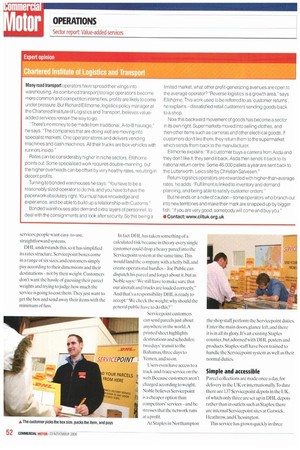Expert opinion
Page 52

If you've noticed an error in this article please click here to report it so we can fix it.
Chartered Institute of Logistics and Transport
Many road transport operators have spread their wings into warehousing. As combined transport/storage operations become more common and competition intensifies, prof its are likely to come under pressure. But Richard Ellithorne, logistics policy manager at the Chartered Institute of Logistics and Transport, believes valueadded services remain the way to go.
"There's no money to be made from traditional. A-to-B haulage," he says. The companies that are doing well are moving into specialist markets. One operator stores and delivers vending machines and cash machines. All their trucks are box vehicles with runners inside."
Rates can be considerably higher in niche sectors, Ellithorne points out. Some specialised work requires double-manning, but the higher overheads can be offset by very healthy rates, resulting in decent profits.
Turning to bonded warehouses he says: "You have to be a reasonably sized operator to do this, and you have to have the paperwork absolutely right. You must have knowledge and experience, and be able to build up a relationship with Customs."
Bonded warehouses also demand extra layers of personnel, to deal with the consignments and look after security. So this being a limited market, what other profit-generating avenues are open to the average operator? "Reverse logistics is a growth area," says Ellithorne. This work used to be referred to as 'customer returns', he explains dissatisfied retail customers sending goods back to a shop.
Now this backward movement of goods has become a sector in its own right. Supermarkets moved into selling clothes, and then other items such as cameras and other electrical goods. If customers don't like them, they return them to the supermarket which sends them back to the manufacturer.
Ellithorne explains: "If a customer buys a camera from Asda and they don't like it, they send it back. Asda then sends it back to its national return centre. Some 46,000 pallets a year are sent back to this Lutterworth, Leics site by Christian Salvesen."
Return logistics operators are rewarded with higher-than-average rates, he adds: "Fulfilment is linked to inventory and demand planning, and being able to satisfy customer orders."
But he ends on a note of caution some operators who branch out into new territories and make their mark are snapped up by bigger fish: "If you are very good, somebody will come and buy you."
• Contact: www.ciltuk.org.uk




































































































































































































































